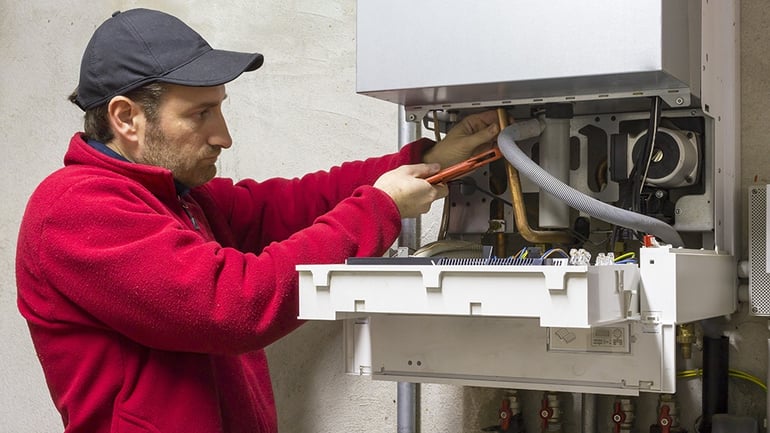 While you may be concerned to find the needle on your boiler’s pressure gauge in the red, don't panic yet. Before you ask, "Why is my boiler pressure too high," Warner Service has a few do-it-yourself solutions for you.
While you may be concerned to find the needle on your boiler’s pressure gauge in the red, don't panic yet. Before you ask, "Why is my boiler pressure too high," Warner Service has a few do-it-yourself solutions for you.
Pressure builds inside a boiler as the water is heated. Once the pressure inside the unit becomes too high, the pressure valve is designed to release the excess pressure. Once your heating system is turned off, the pressure gauge should begin to fall back into a normal range.
What should you do before diagnosing the boiler problem?
Before you begin diagnosing your pressure problem, gather background information on your home's boiler. You'll want to know the following about your boiler:
- Pressure requirements
- Type of boiler
- Maintenance history
All of this information can be found in the user manual and will be beneficial when searching for how to repair your boiler.
What are the pressure requirements?
All boilers have a specific requirement for the amount of pressure that should be in the unit. High- and low-pressure systems exist, depending on the type of heating installed in your home.
Most residential boilers fall into the low-pressure category, which means the operating PSI should be around 12. Check the user manual to see what the correct PSI is for your unit.
What type of boiler do you have?
The type of boiler can also make a difference in providing maintenance for high-pressure systems. Typically, your boiler will either be a watertube or firetube boiler.
This is important because watertube boilers tend to be able to handle high pressure while firetube boilers are used for low pressure. This means the wrong type of boiler can be detrimental to your HVAC system, causing pressure concerns.
What's the maintenance history?
As you're doing research on boilers, it'll become apparent that certain maintenance can lead to specific problems. Knowing your boiler's recent maintenance history helps you analyze if there's a correlation to the problem.
For example, after a heating system is repressurized, it's common for pressure to rise because the valves were left open.
What if the pressure doesn't fall?
If the pressure in your system remains high after turning it off, try a few other do-it-yourself solutions to bring it down.
First, double-check that the pressure gauge is locked. Sometimes, the pressure gauge is left open after maintenance or accidentally knocked out of place. If this is the case, tightly close the valve for pressure stablization.
After checking the valves without success, bleed your boiler system to release excess pressure. This is normally reserved for maintenance checks, but the pressure can occasionally mount too high in-between visits from a professional. Follow the instructions in the user manual for how-to information.
Another part to look for on the radiator is a “drain point”, which is found under the radiator. If you can find this, release some of the unit's water through this release point. This may lower the pressure in your unit enough to stabilize it.
Note: A warning sign of too much water in the unit is leakage. This water may be seeping out from the pressure release valve, located on the wall that the unit is attached to.
If your unit is still showing a reading at or above 2.75, call a professional. Using a boiler with high pressure can cause the system to overwork and/or damage your home.
While your unit may remain operational for the time being, it's best to call a professional to look into the pressurizing problem as soon as possible.
If you'd like more information about boilers and boiler maintenance, check out Warner Service's boiler maintenance checklist:


